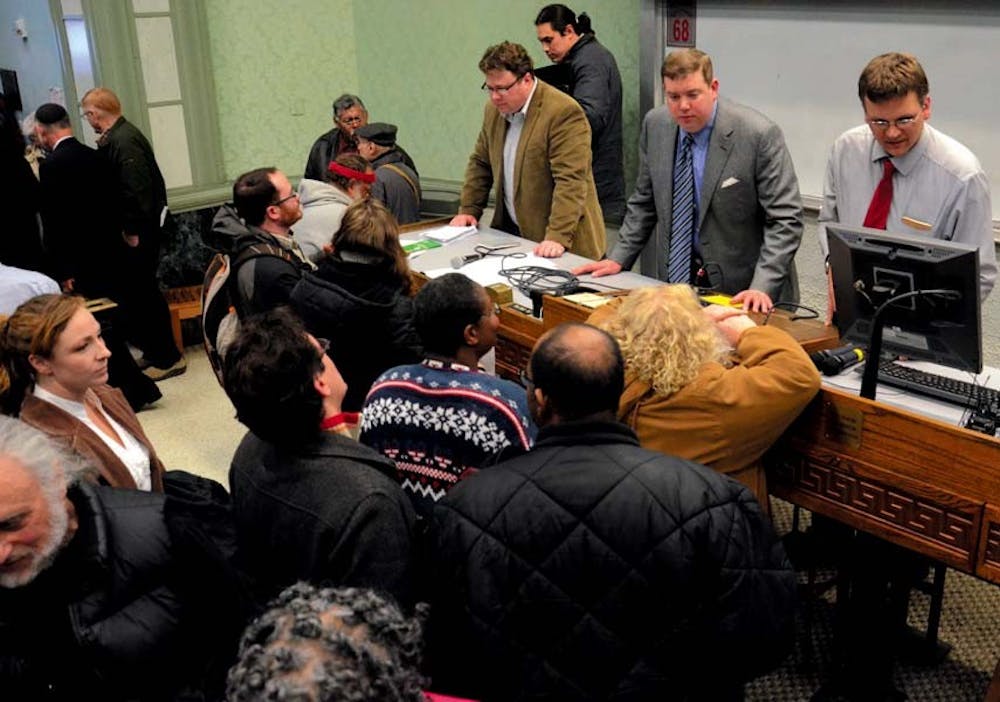
The tension was palpable Wednesday night as around 200 West Philadelphia residents gathered for a meeting about the city’s property tax overhaul.
Councilperson Jannie Blackwell’s words sum up the prevailing sentiment of the evening: “It’s just not fair. People can’t afford it.”
Blackwell, who represents University City in City Council, was one of four panelists answering questions regarding the Actual Value Initiative — a massive reassessment of every property in the city that is likely to lead to large tax increases for area residents.
The event was hosted by five neighborhood associations at Griffith Hall at the University of the Sciences.
Overall, home values in Philadelphia will rise an average of 177 percent between fiscal year 2013 and FY 2014. A Daily Pennsylvanian analysis showed home values in the Penn Alexander School catchment zone — which includes a large area just west of campus — will rise by an average of 268 percent.
Many attendees questioned the legitimacy of the revaluations, noting that in many cases, houses on the same block were assessed at much different values.
Meeting attendee James Beck said that his half of a twin house on the 4700 block of Windsor Avenue was valued over $100,000 lower than the other half. He does not plan to appeal because he estimated he will pay $700 less in property taxes per year than he currently does, but he was concerned about the equity of the new system.
“I think something is off,” he said. “The assessment process seems just about as random as the prior process.”
University City Property Tax Increase from dailypenn on Vimeo.
Others demanded an answer to how houses on the same block could be valued so disparately.
Ritchie McKeithen, the chief assessment officer at the city’s Office of Property Assessment, said the process involved analyzing sale prices in neighborhoods over the past five years as well as building permits and attributes of each house.
However, McKeithen admitted that the system is not completely accurate. He noted that problems arise because OPA couldn’t enter houses during the appraisal process. “Some of the inequities we have seen so far stem from people who have taken out permits versus people who haven’t taken out permits,” he said.
“We know there’s nothing such as a perfect assessment process so we created a first-level review process … where you can file an appeal and contest your assessment right to the OPA,” he said.
Both McKeithen and Kevin Gillen, a Fels Institute of Government researcher who worked with the city in developing AVI, emphasized that previous valuations were much further from true market value than new ones.
They said that many poorer areas of the city — such as North Philadelphia and Germantown — have been overvalued for years, while areas that have seen revitalization — such as University City — have been undervalued. When asked why the city couldn’t phase in the increase in property taxes to ease the burden, they cited the fact that residents in historically overvalued neighborhoods could file a lawsuit against the city.
Some also expressed discontent at the fact that nonprofits, including Penn, don’t pay property taxes even though some own a vast amount of land in the area. Penn voluntarily pays the city for the PILOT program — Payments In Lieu of Taxes — but Blackwell claimed that the system is inefficient.
Michael Froehlich, the president of Cedar Park Neighbors, one of the associations that hosted the event, said he has heard from many residents who are concerned that the new tax system will change neighborhood compositions.
“The community associations are receiving dozens of requests from neighbors about how the AVI would affect not only their own houses but those of neighbors and how it would affect the look and feel of the neighborhood,” he said.
Froehlich, a resident of the 4800 block of Larchwood Avenue, said his taxes would go up by at least $2,300 per year.
“We don’t want people to have to move because their taxes triple or double,” he added.
The Daily Pennsylvanian is an independent, student-run newspaper. Please consider making a donation to support the coverage that shapes the University. Your generosity ensures a future of strong journalism at Penn.
DonatePlease note All comments are eligible for publication in The Daily Pennsylvanian.





